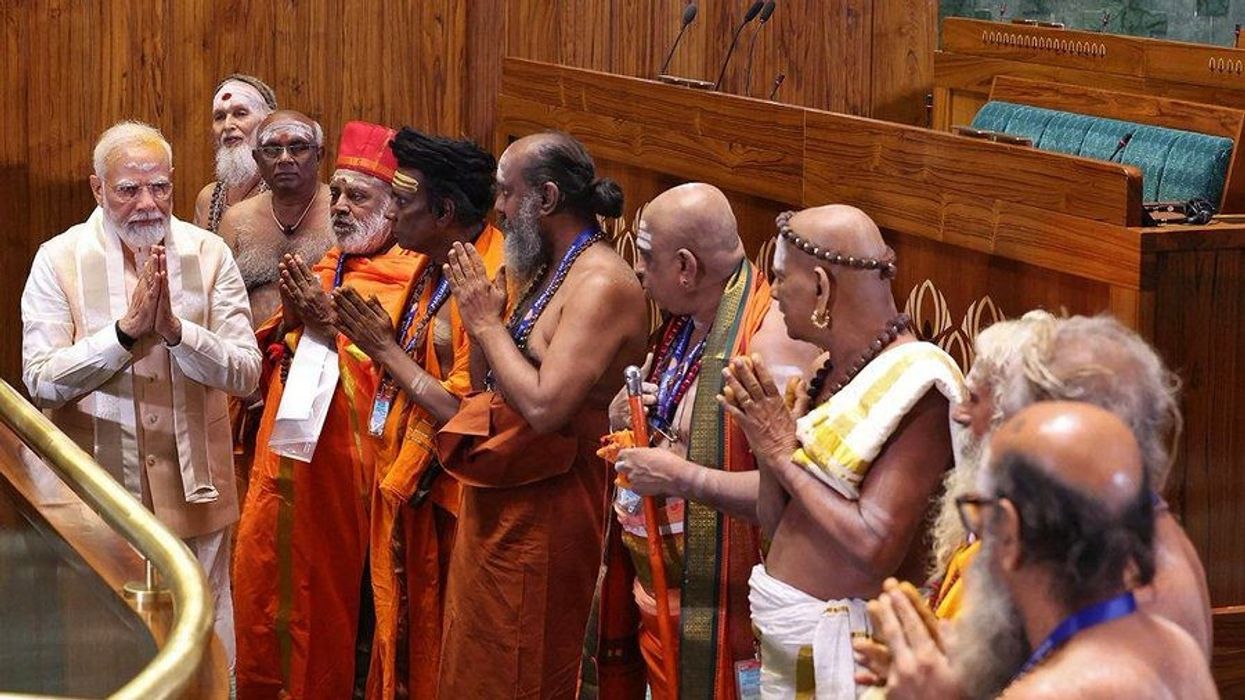The inauguration of the new Parliament building on Sunday (28) witnessed a significant development as 21 opposition parties boycotted the event, levelling allegations against Prime Minister Narendra Modi for treating it as his personal "coronation."
According to the opposition leaders, they believe that democracy is upheld by the people rather than by buildings.
Additionally, they criticised the government, accusing it of violating Constitutional norms by neglecting to extend an invitation to President Droupadi Murmu.
The government, however, rebuffed the opposition's claims, asserting that no protocols were breached and emphasised Modi's deep respect for the President.
The Congress claimed the new Parliament was inaugurated in a grand fashion by a "self-glorifying authoritarian PM with utter disdain for Parliamentary procedures". Democracy does not run from the buildings but through the voices of the people, Congress chief Mallikarjun Kharge said.
Congress leader Rahul Gandhi said Parliament is the voice of the people but the prime minister is treating the inauguration of the new building like a "coronation".
"Parliament is the voice of the people! The prime minister is treating the inauguration of the Parliament House as (a) coronation," Gandhi said in a tweet in Hindi soon after Modi inaugurated the building.
Jairam Ramesh, who serves as the Congress general secretary in charge of communication, expressed his concern regarding President Droupadi Murmu's role in the inauguration of the new building.
Ramesh highlighted the fact that President Murmu, who holds the distinction of being the first woman from the tribal community to assume the position of head of state, was denied the opportunity to fulfill her Constitutional duties by inaugurating the new structure.
"A self-glorifying authoritarian Prime Minister with utter disdain for Parliamentary procedures, who rarely attends Parliament or engages in it, inaugurates the new Parliament building in 2023," he said.
During a press conference, Congress spokesperson Supriya Srinate criticised the government's decision to exclude the President from the inauguration of the new Parliament building, asserting that it reflects a discriminatory attitude towards women and Dalits.
Srinate described the event as Prime Minister Modi's "rajtilak" or coronation, implying that it showcased a sense of self-importance.
Additionally, Nationalist Congress Party (NCP) president Sharad Pawar expressed his concern over the various rituals performed at the inauguration, interpreting them as a regressive step taking the country back by several decades.
During the grand inauguration held in the morning, several significant events took place, including a havan (sacred fire ritual), a multi-faith prayer ceremony, and the installation of the Sengol (a historical sceptre) in a dedicated enclosure within the Lok Sabha chamber.
The Left parties drew a parallel between the Prime Minister's role in the inauguration of the parliament building and the ceremonial crowning of a monarch, suggesting that such an act relegated the people of the country to the status of "subjects" or "praja."
Their comparison emphasised their viewpoint on the perceived power dynamics and symbolism associated with the event.
CPI(M) General Secretary Sitaram Yechury alleged the inauguration ceremony was held amid "loud propaganda" with the declaration of a "new India". "This declaration of a 'New India' comes in the absence of the President of India, Vice President of India and opposition parties! India = Nation and Citizen; New India = Raja and Praja."
"Sengol belongs to the period of feudal monarchies, emperors and kings. Indian people overthrew such bondages and ushered in a secular democratic republic where every citizen is equal. Sengol has no role in a democracy where people elect the government," he tweeted.
Union minister Arjun Ram Meghwal attacked the opposition dubbing their decision to boycott as an example of "cheap politics" and also slammed them for questioning the relevance of the historic Sengol.
(PTI)




